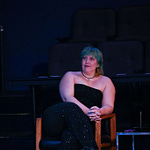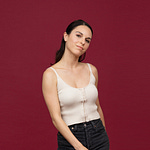Everyone please welcome my sweet friend and mindset coach, Amy McNabb, to A Broadway Body: Continued Conversations! I’ve known Amy since 2021 when we met in an online business program. She’s slowly but surely become a dear friend of mine as well as the mindset coach I work with as an actor and a business woman. Amy is a voice actor, a singer, and a mindset coach for actors and businesswomen. Amy’s work has impacted me deeply. She has a special way of supporting female actors, and there was no doubt I needed to bring her on for a conversation.
Amy shines a light on so many vital body image topics. Her thoughts on removing yourself from the societal matrix is a beautiful representation of what it’s like to be combating diet culture and the harmful side of the beauty industry. She discusses how to navigate wardrobe as an actor both on stage and on screen. She also shares her personal journey with listening to her body and intuitively eating. This conversation with Amy was wildly healing for me, and I hope it’s healing for you too. I hope you walk away reminded of just how much you sparkle, and in the words of Amy, “Shine, baby, shine.” ✨
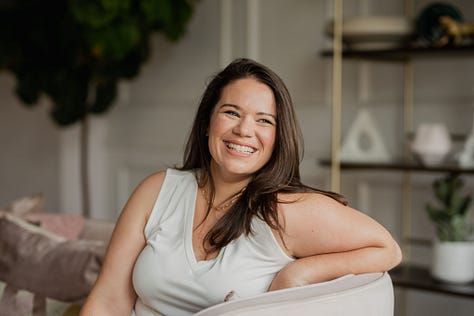
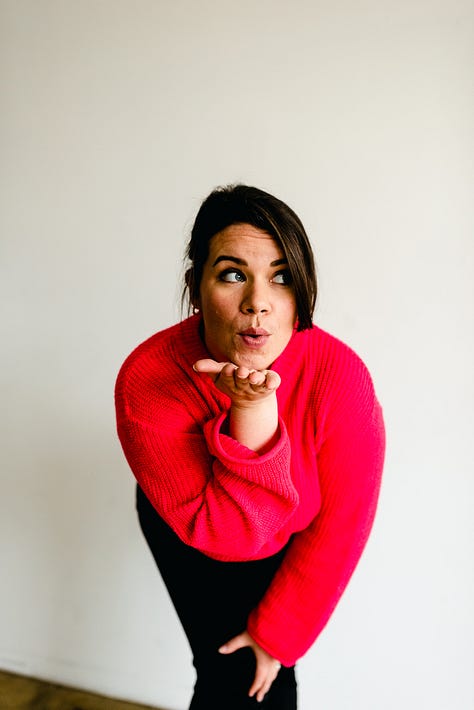
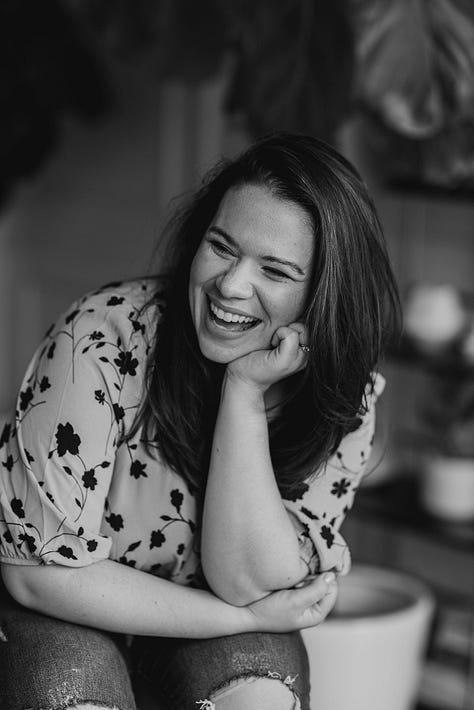
“ [This conversation] was a cool opportunity to step outside the Matrix a little bit and observe it and also observe it in a way that's not negative. Because I think it's really easy to be like, “This fucking sucks. It sucks that there's diet culture. It sucks that we are supposed to be thin. It sucks that we're in a time that there's a magic pill, magic shot that'll make you thin,” which for some people is super freeing, which is awesome. But it's a hard time, a hard thing, and it's easy to just like, “Damn the torpedoes,” and just be like, “This sucks.” So it's fun to talk about it in a way that's like, well, we're all in it together. We're just kind of in different spots of it, but we're all here.”
- Amy McNabb
Megan Gill: I'm wondering, because you specifically work with actors and because the stuff you're working on is a lot of the mindset stuff, has body image come up for you with your clients? Obviously, please do not disclose anything. But I'm just curious to know how often that comes up, if that's something that you find yourself approaching with your clients, and just how that shows up for you in your work.
Amy McNabb: Yeah. So it does come up, I think, especially because I work with women. All of my clients know this, and I will say it here publicly, I am not a therapist. I'm not a licensed therapist. I do not have a degree in psychology, and I do not have certifications in body image management or eating disorders or body dysmorphia or anything like that. So I'm very careful in those conversations because I'm very aware, being friends with a lot of folks who are. Experts in that area and having dealt with body dysmorphia over the course of my life and disordered eating in various forms over the course of my life, I don’t ever want to say the wrong thing, and I think to each person it is such a sensitive topic, right? So I am very careful when it comes up. And oftentimes in sessions when, when something comes up, whether that's a body related thing or any kind of trauma related thing, that's typically in the conversation where I will say, “So, as a reminder, a therapist. I'm not certified in this. I'm not licensed in this. So anything that we talk about within this, this is gonna be me as a friend, and it's not a professional opinion,” because I just want to be really careful, and I, and I try to just find ways to lift up the person and remind them who they are and how powerful they are and that, you know, they’re beautiful as they are. But it does come up, right, because especially if you're on camera or on stage, you're being seen in an amplified manner. And so, you are feeling more exposed.
And so it definitely has come up. It's interesting because it comes up across the board, but you know, with newer actors, a great example is the first time that they try on costumes for a show, let's say for a stage show, and if they're newer, it's like, “I don't like the way my body looks in the costume. I don't like the way I feel. Everyone's gonna see me. Why does she get to be the pretty girl and I have to be the frumpy one? All of that stuff comes up. And in my job in that moment. My job is to really just let them know they're not alone in that feeling and that that's super normal and that no matter what, when you're doing theater, let's say, or film, when you put on the costumes for the first time, there's definitely gonna be a moment where you're like, “How do I look? How does my body look?” And how's a lot of work there as internally as a person to say, “Well, how does this serve the character?” right? But that's always gonna be the second thought.
The other area that comes up a lot is in headshots. Yeah. I think in headshots it's – the advice I typically give with headshot is, especially if you've struggled with body dysmorphia or if you've struggled with just the way you look in general, when they come back to you, do a first glance, scroll through, and then you'll get all of those thoughts, all of the negative thoughts. You're gonna notice all the things that you've hated about your body for a long time, or the things that you used to hate about your body, or the things that you love about – you might not notice the love, but the hate's gonna come first. And so, typically I’m like, “Do a flash through. Do not actually make any assessment of them and whether they're good or bad, but put them aside. Take a couple days, and then go back, and typically that nice voice will kind of come through.” So yeah, those are really the two areas where it comes up the most.
Megan Gill: This is really interesting to hear because as I'm sure you might be able to relate with this in your own ways, but as someone who's been acting for a long time, both on stage and on screen, I feel I'm so immune almost to seeing myself in these various forms, in various costumes. I mean, I haven't been on stage in a long time, so there's that. But it makes so much sense that for a newer actor, especially someone who's maybe in their adult years or post-college grad to have all of these thoughts come up. Because I feel it's a little bit different when you're a kid. I'm really glad that they have you. And yes, you're not a licensed professional, per se, but the ways in which it sounds you are uplifting your clients and you're reminding them that they're good and reminding them, “Hey, how does this wardrobe serve character?” Because ultimately that's what it's about. Just having that other – one more voice reminding you that you're okay and that sometimes we are our harshest critic.
I love the rundown of, “Give yourself some time with your headshots. Try not to be too overly critical,” because oh my god, no matter what, no matter how I'm feeling about myself and my body, I can look at a session, and we can always find something that we don't right? That's inevitable.
Amy McNabb: Yeah, and I think, you know, it's interesting, right? Because I think for maybe more seasoned actors, you could still have the moment with the costume where you're like, “No, please don't put me in this in front of other people.” But I think there's more of a muscle that's been worked over the years where you can be like, “Okay, well, I don't have a choice. Or maybe I do have a choice. Maybe I can give feedback and be ‘Hey, can we let these pants out a little bit? Because they're really tight for what I'm trying to do,’” right? So you have more options, I think, when you've been in it for a while, because you know you can ask, but also you do have that muscle of, “All right, well, it serves a character and also there's nothing I can do in the meantime, so moving on.”
But that's not to say that I don't have these conversations with people who've been in it for a while because our bodies are always changing, especially as women. I mean our bodies change over the course of a month. The different parts of our cycle have different body reactions, different hormones, different, you know, water retention, all kinds of things, and also different eating habits, which can make people feel a certain way. So I definitely talk to seasoned actors about this also. And often within that, the conversation's less about what my costume looks and more, “I don't recognize myself,” or “I don't feel like me, and it makes me anxious to be seen in this moment.” But what I love and admire about all of my clients and about actors in general is that, typically, we push through that because we love the art so much and we love an opportunity to do what, to quote a client, what makes us feel we're flying. And so, we will move through it. It is painful often, but we'll do it because it's an opportunity to do the thing we love, you know?
Megan Gill: I have to wonder how much moving through it and circumventing all of those thoughts and struggles and inner things that we harp on, I wonder how going through that all and getting to the actual art and the execution of the art, then, I don't know, helps us work through all that stuff even on a subconscious level. I don’t know. That's just such an interesting point to bring up.
Amy McNabb: So I grew up doing theater, and then I did a tiny, tiny bit of on camera, and then now I do voiceover. Theater's interesting, right? Because you have the moment when you put on the costume and you're like, “Oh boy.” I always played the nerds. I was always a character role. I was not the ingenue. I'm kind of too funny and too loud to be the ingenue. So I was always these other character parts, and so the costumes were always – there was always a moment. In college, I remember walking down the hallway once and the third show that I was in and one of the upperclassmen, I was in another rough costume, just a big flowery, floral hat, and I was supposed to be this kind of unattractive woman. It literally described that, “unattractive woman,” in the script. And this upperclassman who, you know, I loosely had a crush on (but who knows, I had a crush on all of them), he walked by and he just went, “Ugh, woof,” to having another costume that was unattractive.
Megan Gill: Wow.
Amy McNabb: I remember kind of laughing with him because he wasn't a bad dude. He wasn't being a jerk. He was just kind of being like, “Oh my God, you're in another shitty situation as a 19-year-old,” you know? And I, but I remember feeling that and then being like, “Yeah, but I'm really funny. It works for the thing.” And it hurt, and the thing that I stood by was – someone said this to me, actually I forget, it might have been a teacher. In theater, and really in all of it, yes, I had to wear the costume on stage. That's when everyone sees you, but everyone also sees you when you come out at the stage door. And so, you get to come out as you, and I love the way I look and I love who I am and I, you know, was really proud of my work, and I don't always love the way I look, but you know, there was enough confidence behind it that it was like I get to come out with my brown hair and the clothes that I chose and the makeup that I want or don't want. I get to decide. So there was some agency in that that kind of gave me some freedom. And I think that’s also what I tried to give to clients who were thinking about it in theater.
But in film, I remember the first time I did a commercial workshop in New York, and there was a monitor what was on the camera. I remember trying to focus on the teacher and constantly just looking to my right, being like, “That's my face. That's my face real big and close up and all of you were looking at it twice.” And I didn't say it, but my system was kind of glitching out because I was 22, 23, and I was like, “I don’t like this. I don’t like that there.” I think now at 35, I think I'd feel a little differently about it just because there's just a different level of confidence at this age.
Megan Gill: Right. I can very much relate to that trajectory as well of coming up in theater and it's almost yeah, you're in the fitting room, you're with the wardrobe designers trying on your costumes, XYZ, and you're looking at yourself in the mirror and then you're in the dressing room getting ready for the show. And you obviously can see yourself in the mirror. But then once you're on stage, it's this interesting thing of there is no mirror. You are just there. And there is a bit of freedom in that I feel we do not have when it comes to film and TV and the hyper ability to see yourself, or even if you're on set and you aren't looking at the monitor, you're still so aware that you're being seen by X amount of people potentially in very close-up shots or whatever it may be, you know?
Amy McNabb: Yeah, and one of the things as I moved to LA and started doing some, you know, indie film type stuff, short films and things, because I think when it comes to body image and. way we look at all this stuff. For me, the two things that have always gotten me are the size of my body or the curves and then acne, because I grew up with pretty bad acne, and I still occasionally have it, but overall it's cleared up just being in my thirties. But I remember in my twenties moving here and being like, “Oh my god, I'm gonna do on camera.” And I always had hormonal breakouts down here on my chin. And I remember asking a makeup artist, I was like, “Can you cover this?” And I remember her saying, “We can cover color but not texture.” And it freaked me out because I was like this is just gonna be permanent, in these films? You're just gonna be able to tell?
And it's wild because our TV quality has gotten better and better and better. And so, when I watch some shows that are older, I'm oh, you can tell that they had acne that was covered by a certain type of makeup, but the quality of TV that we were watching, the technological quality, you couldn't tell, but now you can because everything's high def or whatever. And it's really cool and also, as an actor, very frustrating, and it's a mental gymnastics game. The thing that sucks is that, as an actor, those aren't the mental gymnastics you want to be doing. You want to be doing mental gymnastics with the character and the intention and the scene and the chemistry, and also the logistics of what the hell the director just told you to do. You don’t want to be doing mental gymnastics about how does my stomach look? How does my face look? How does my hair look? But it's really hard.
Megan Gill: Right, right. It's two sides of the same coin, where on one side, as the actor, it is a struggle with something, like you were speaking about having acne and being like, “Okay, I'm gonna be the person that's gonna show up on camera.” And it's really vulnerable and can be really scary to be that actor showing up in that way. And yet at the same time for viewers and people watching to be able to say, “Look, she has acne too. It's okay!” To not villainize it as much, but it's unfortunate that our society has villainized all these things, particularly about women's bodies, that us as the actors then feel this insecurity showing up with these “societal imperfections.” That's such a delicate dance. Yes, it's so important for us to show up with these things that make us feel insecure and put them on display, if we want to, if that's something that we're passionate about, which I feel is something that I am trying to do more and more of so that others can feel less alone, so that others can feel more seen in their insecurities.
Amy McNabb: Yeah, and one of the catches to it, though, that I have found is kind of like stepping outside the matrix. It's if you decide – I’m just gonna speak to a woman's experience because it's the one I have. I know that men also have eating disorders, and I know that men also struggle with body dysmorphia and it's just in a different way. You know, as a quick aside, when I think of the sitcom trope, it's the woman is hot and the man doesn't have to be as hot, but he does have to be funny. There is kind of an interesting dynamic there to assess, but that's a digress.
But to come back to women, you know, if you decide to be the kind of person who does the work to undo what society has put on us, what the patriarchy has put on us, and what diet culture put on us – as millennials, we grew up reading those magazines that were like, “You could have a body like Britney Spears, just if you don't eat bagels in the morning and you just do 15 minutes of belly dancing.” And, no, these celebrities were on – first of all, the amount of dancing that woman did, just let alone everything else. But that kind of communication really hurt our brains. But if you decide to do the work to come out of that, you are living outside the matrix, and when you get to set, you are going to encounter other women who are not living outside the matrix –
Megan Gill: Yep.
Amy McNabb: – who are very much so inside it, and we're not judging them, but communicating with them is really hard because you might have someone who's inside the matrix who's still hurting. You might have someone who's inside the matrix who's like, “I crush it here. I feel great. I've got the body I want. I'm not worried about it.” But more likely you're gonna run into someone who, you have done the work – I'll speak just for myself.
I have done work to try to intuitively eat rather than panic, right? Or rather than not eat for most of the day, because I don't want to be a burden to someone on set or in the studio, I do the work to bring my food and intuitively eat, right? But then you go to lunch, and another woman had to grab crafty or had to grab McDonald's to eat, and they're beating themselves up for eating McDonald's like, “Ugh, this fattening,” you know, “Oh my god, I'm eating McDonald's,” right? In that moment, you have to simultaneously put your guard up so that you don't fall into the matrix and also, for me, decide, “Do I want to try and help? Do I want to contribute to this conversation and how? You have a couple options. Option number one is you don't say anything. Option number two is you agree with them and just play along in the matrix game. Option number three, you know, which I chose recently was – what did I say? I was like, “Oh, that looks delicious. That looks so good. I'm stoked that you got McDonald's. What a treat, right? That's such a fun thing to get a Happy Meal.” Also what well-named marketing to get a Happy Meal, right. And then the fourth option, which I didn't do because I didn't know the person really well, but another person on set did, they were like, “Hey, remember we don't shame food. You don't have to shame yourself for food.” But that person knew them. They're good friends, so it was a reminder to them. So stuff like that, you do have these options.
But all that to say, when you're trying to unpack this stuff and trying to make it in the world, you have to recognize you are kind of living outside the matrix a bit, and you're gonna interact with people that are still very much so – and men too, right, who are very much so still inside the matrix, and you have to decide do you ignore it, do you participate in it, do you try and teach it, or do you call it out? And it's not easy because your own stuff can get triggered and brought up by it, you know?
Megan Gill: Right, absolutely. It's almost more of an emotional weight to carry than to not only have to worry about ourselves, but to want to help others. Yet at the same time, I think that you put it very beautifully because you have agency and you have the choice to maybe just say nothing or to maybe play along, even though, I mean, I don't love playing along. I never feel comfortable with playing along, but sometimes if that's what you got to do to protect yourself or to care for your nervous system in that moment, then that's what you got to do. And then there are other times where maybe you can chime in like you did. I love that you did that because that stuff is so important too. But at the same time, it's such a delicate, nuanced conversation because it's not our job to do that for other people. Yet, I do think when we feel empowered to do so and when we feel safe to do so, I think it's important if we can do that and can say something, you know?
Amy McNabb: And I was really excited because at the end of that day, that person happened to mention it again and was like, “And it was really good! The McDonald's was really good! And I was like, “Oh, that's so fun to hear, right?
And also I want to be clear too, that the choice to play along – I think when I was younger I probably played along a little bit more, and then now that I'm older, I realize that my voice doesn't have to be heard in every situation. That was something I had to learn was I don't have to contribute to every conversation. So sometimes for me, silence makes the most sense when my nervous system isn't feeling so good, if I'm feeling super safe. That day, I happened to have food that I felt great about and I felt I had prepared, so I was really calm. But let's say it had been a different day where I hadn't eaten anything because I was rushing around and running late and then that happened, and let's say I was also eating McDonald's or something, or eating Burger King or whatever, I might not have been able to participate as much because maybe I would've been a little bit more insecure about whatever.
So in that moment, silence is okay. We don't have to martyr ourselves to, to try and fix the fucking patriarchy. That's not gonna happen. You’ve got to do what's right for you. But it is imp I think it's important as you do work on yourself and the emotions, and this is true for everything, right? You get to decide how you talk to people who maybe are still in the matrix or not.
Megan Gill: I agree fully and just making sure that you're checking in with yourself day to day, because like our bodies change day to day, our mental states, how we relate to our bodies, how we're feeling changes day to day too. So I think it is important to note that it can shift, and we can still be doing good for the things we care about and doing good for other people and fighting the patriarchy slowly but surely, and that's a little bit more sustainable than being like, “Okay, I'm gonna go out into the world today and I'm gonna combat anyone that wants to say anything about blah, blah, blah.”
Amy McNabb: And also, let's be honest, if I were having a bad food day, meaning I felt shitty about whatever I was eating, not what I was eating was bad. But let's say that I was having a bad body day and I was beating myself up at lunch about whatever I was eating, I do not want someone on a fucking soap box. If I'm having a bad food day or a bad body day, and I say something in alignment with that, I don't want someone on a fucking soapbox to come up to me and be like, “By the way…” You know, I don’t need that. So it is important, too, to recognize the moments where you can participate in the moments where you can help and the moments where maybe silence is okay. You’re not anybody's therapist, and you don't have to fix everything.
But yeah, to me, I think it's just important to remember everybody's at a different place in their journey. I've read intuitive eating, and I've done a bunch of work, and I still struggle with my body and I still struggle with food. And sometimes I feel bad, and you know, everybody's issues are different. I no longer feel bad about the food that I eat, but I do feel bad sometimes about the lack of movement in my life, right? And then some people have movement down on lock, meaning they love what they're doing with their body. They feel good about how they're moving it. And I don't really have that yet. So it's not like I figured out intuitive eating and I'm deciding when to tell people. It's just like we're all in progress. And so, recognizing that you're not further along or behind on any journey, you're just on yours, and then you can decide when and how you share that with people I think is the distinction, you know?
Megan Gill: Agreed, and just the recognition that everyone is on their own journey, and you don't necessarily know unless you're close with someone, right? You don't necessarily know what that boundary is or where they're at. So just being careful as well. Like, yes, I love to chime in and be like, “There's another way,” or “That's okay. Let's not villainize the food you're eating. It’s good, it's yummy.” I love doing that stuff, but also I find it a lot easier to do it with the people that I'm closer to. If one of my close friends over here is talking shit about her body or saying something weird about food or whatever, I feel a lot more comfortable to be like, “Hey, I know you. I know we don't have to do that,” you know?
Amy McNabb: Yeah, one of the most impactful things at the beginning of me trying to undo some of the diet culture stuff was actually a friend of mine who was not saying anything about me or my diet culture or what I was doing, but we were out in LA and there was a juice company that had one of those foldable chalkboard signs and it said, “Juice cleanse! Lose X amount of pounds in whatever amount of days.” And she just goes, “That fucking infuriates me.” And I was like, “Whoa, why?” And she was like, “Because it's bullshit. It's peddling diet culture. That's crap. That's not okay.” And we were walking and I thought about it. This had to have been three or four years ago, maybe more. She's actively saying that marketing isn't okay. “That's bullshit. It's a lie also, and it's false advertising. And also why is that what we're trying to give people. What is this?” And I think that her just questioning and rejecting some of the diet culture was really for herself, right? Because I don't think she was trying to teach me anything. She was just saying, for her, “I’m just gonna just call out when I see diet culture and say no,” you know? And even that can happen on menus and stuff, right? Where it's the low fat thing, the healthy thing, healthy choice. Blah, blah, blah, blah. And the healthy choice is not always the lowest calorie choice, you know? So I think that that was really helpful for me too was just someone kind of calling it out first. I was like, “Oh, maybe I don't have to participate in this,” you know?
Megan Gill: The number one thing that comes up for me is being around friends or people or whoever, and you're out to eat and they're like, “I'm not gonna get the fries. I'm gonna get the salad.” It's always fries versus salad fries versus salad. And it's we're villainizing the fries and we're – yeah, fries are always the move. Come on. It's become this thing where I've noticed that it's the fries are the villain, and the angel is the salad. And that's the way that I feel it's related with a lot of people instead of it being, “Oh, today I'm really craving fries,” which is kind of like – I am also familiar with intuitive eating, and I've worked really, really hard to get to a place where I am listening to my body and what it wants on that day, in that moment. And then other days I feel I really want the salad, but not because I'm trying to be “healthy” or I'm trying to have a “cheat day” with the fries. I feel like that's an interesting conversation too.
Amy McNabb: It's funny, it just happened the other day where I had this moment where I went, I was out and I got a burger, and I got a salad on the side instead of tater tots or chips or whatever. And I made that choice because, just in that moment, because by the way, the tater tots at this bar, they're so good. They're my favorite thing. But what I recognized for me was I was like I haven't had a ton of vegetables today, and I will probably feel better if I have vegetables. And also one of the main – this is my logic, just walking you through my logic, right? I was like one of the main ways that we eat burgers here at home when I cook is I just make the burgers and we have a big spinach salad with balsamic, and then I do air-fried sweet potatoes, and it's one of my favorite meals and it's one of my husband's favorite meals.
So what happened was at the bar, I was like, “Oh, I could get tater tots, and I was like, “Oh yeah, I haven't really had a lot of vegetables, and I really like burgers alongside salads. I'm just gonna get the salad today and see if I like their salad,” because I had never had it. I got it. I still got bread, the burger was still on bread, right? We're not damning the carbs. I was just like let me see.
So I get it, and one of the people I was with was like, “Oh, you're being good. You got a salad.”I was I was like, “I'm not really being good. I just, honest to god, wanted a salad. I just kind of wanted it,” and I walked him through what I had thought through, and I was like, “But those tater tots are the bomb. I get those other days. It's just not today.” But it's really challenging when we've been given language that's like, “This is good, this is bad,” when it comes to food, as opposed to – not every choice we make can be intentional. We do not have enough bandwidth to be intentional every single time we make a decision. We make a hundred million decisions a day, a scientific number, okay? But when I think about the fact that it's being asked to be intentional about every bite of food you put in your mouth is asinine. We don't have bandwidth for that in the society that we live in.
So if it's like, “Well, I'm just trying to be intentional about I want more vegetables.” No, in that moment I looked at the menu and I was like, “Oh, I wonder if I'd their salad.” And the thing about trying to do this work and still doing the work and still trying to figure it out is it takes time. It takes time to be like what do I want to eat, and what purpose will this food serve?
We went out for pizza and ice cream last week because I was like I want to celebrate and I want pizza and ice cream. Didn't think twice about the fact that there was no salad. I didn’t give a shit. Now, the flip side of it is, for me, I want to feel good in my body. That changes day to day on what makes me feel good in my body. Sometimes hiking makes me feel good. Sometimes yoga makes me feel good. Sometimes burgers make me feel good. Sometimes salads make me feel good, you know? But I guess just to speak for myself, all I'm trying to do is feel good in my body. I'm not on a soapbox here. There are still parts of my body that I want to change, and honestly, the thing I'm grappling with the most is how do I change my body – roll with me here because it's gonna be hard to communicate. How do I change my body without getting stuck in diet culture, without going backwards to what I grew up with? How do I feel powerful in my body without being hard on my body? How do I feel confident and sexy and beautiful as I am right now and also be okay with changing it? That's the wrestling match that I am in right now. My wrestling match is no longer with salads and fries. But I say all that because I don't want to come on here and talk and be like, you know, some people have read intuitive eating and some people haven't. That's not, you know what I mean?
Megan Gill: Of course, of course.
Amy McNabb: I think everybody has their wrestling match internally. It might be with body, it might not be, but I guess what my point here, I guess, is that everybody is in a wrestling match with something internally in their head. And since this is about body image and stuff, this is the one that I'm currently in, and my goal within these wrestling match matches are actually to just try and take away the intensity of it and let it be more an informed debate, a debate team, right, or a calm conversation with my body, calm conversation with myself, rather than what it used to be as a kid, which was a WWE fucking wrestling match. There's a loud crowd, and there are a bunch of voices, and it is angry and it is aggressive, and it is mad. And if I ate the fries, I was angry.
And so, now I'm trying to just, whatever the conversation is, whatever the fight is, whatever the challenge is, I'm just trying to – personally, the thing I'm on right now is just trying to take away the of intensity of it and maybe just have it be more peaceful and maybe have it be more patient with it and trust that I'm not gonna have an answer today. Does that all make sense?
Megan Gill: That truly makes so much sense to me, and it's something that I – not to speak for a lot of people, a lot of women out here, but it's something that I think a lot of us are battling. And what you just described so beautifully is one of my big questions of how can we feel empowered in this body today and love this body today yet want to change it in various ways, whatever that may be for you, because of course, nobody is out here like, “I love every single thing about my body.” Unfortunately, that's just not the way the world works, and we're all going to want to change something and/or at some point our body's gonna change, and we're gonna want to maybe change it to be this thing that it was before. But putting the focus on our general wellbeing and feeling good in our body, which is something that you kept bringing up that I love, that I think is a huge component of all of this, focusing on feeling good in our body is only gonna give us the space and the time and the energy and the allowance to change those things, or to change those things in a free, peaceful way, like you were saying, instead of in a fight, because I was in that fight as well, and it's almost like the fight has been exchanged for freedom. A lot of what I experience is a lot of freedom, even though there's still a battle, if you will.
Amy McNabb: It's really interesting because they come up in times when, for me, I'm in a new situation. I told you when I met you in person, we were talking about body image stuff. because that's your brand, and we were talking about it, and I get nervous when I meet clients in person for the first time because you've never seen my full body. You know, I'm 4’11”. Most people don't realize that. I have tall girl energy. She's a small girl. The personality is ginormous in person, but I'm short, I'm curvy, you know, I'm gonna look different than I look on Zoom. And so, I expressed that to you and I remember you saying, “Oh my god, that makes me really sad. That makes me upset. I don't like that for you, right? And I've thought about that a lot since then, and I was like, yeah, that is a shitty thought to have. It's a shitty thing to try and navigate.
And what I've tried to come back around to is this other piece of confidence, which I try to circle back to the idea that's like when you try to take a picture of the moon, you just cannot capture what it is like to be standing in real life looking at the moon at that moment. This is not my own idea, this is something that came off of Instagram, I'm sure. But that feeling. I know that I radiate in person and on Zoom, I love my personality. I'm funny, I'm smart, I'm confident in various ways. I'm helpful, and I sparkle. And I also see the sparkle in other people. This is not just to me, right? I've met clients in person too, who I knew on Zoom, and I'm like they do look different in person, and it's never worse. It's always better because it's not on a computer screen, right? And what's cool about that is when you meet someone in another dimension, right – because this is two dimensions, right? When you meet someone in another dimension, you really get to see more of their soul in a lot of ways, right? Because you get to see how it's expressed in their body and you get to see how do they move through the world and how do they interact with the world. Is it fast? Is it slow? Is it jerky? Is it smooth? Is it clumsy? Is it graceful? All of those things are really beautiful parts of all of us.
And so, all that to say, I try to remind myself that, you know what? I do wish I was taller, and you know what? Sometimes I wish I was thinner. Most of the time I wish I was stronger. That's the thing I'd love to work on. And this is the kind of language change for me is I’m like, oh, sometimes I just wish I was more physically capable of some of the things I want to do for longer. If I go on a hike, it can be really challenging. We go to Colorado sometimes, and those hikes are a doozy because I don't do them all the time, know? And I'm all right, so there are things I want my body to do. There are things I want to change, sure. And I can change them if I want to, but also I sparkle. And so, that's what I try to circle back to when I can. And like I said, for anybody reading this or listening to this, you also sparkle. So the best we can kind of do is try to remind ourselves of that when we get really in our head. And that's what I try to do on my harder days.
Megan Gill: That's really, really lovely and just a reminder that sparkles can speak louder than those thoughts about how we're not good enough or how I wish I was this, or I'm worried about this. The sparkle will outshine no matter what. It’s so true. And when people meet you, they see the sparkle. They don’t see all of the things that you are worried about. I feel that's just true in general. In the ways that we think we're always in our head about ourselves and how judging ourselves, but in reality, no one else is judging you the way you are. They're most likely seeing you through this lens of sparkle. So, I love that. Ah.
Amy McNabb: Yeah, and I think too, you know, what I have found for myself and as we kind of come to a close here, I think, what I have seen for myself too is I am in my head thinking about, “Gosh, I wish these pants were looser. I wish they were different. I wish I'd worn a different outfit. I wish I wasn't in bright pink and everyone else is in black and navy blue,” whatever the kind of thing is that I'm thinking about, that is when the sparkle dulls.
Recently, I went to a pool party, and everyone else was in navy blue, black, and jeans. And I was in Barbie Pink and Kelly Green. I was on Love Island, and they were on the Magnolia Network. It was different. And I walked in, and I texted my husband and I was like, “Oh no. I am in bright pink.” And his response, knowing me for so long, and he's so wonderful, was, “Shine, baby, shine.” Because at that point I’m like, well, I’m in neon pink, so there's no escaping that. So you know, and in previous iterations I would've left, and I had a change of clothes in my bag for later that evening that were, you know, sage green and black. And so, I could have changed to fit in with the Magnolia Network, but I was like, “Mm, I guess I'm on Love Island.” The hours that I was there, there was still a little voice in my head saying, “Are you too much? Are you being too much? Should you shift your body language? Should you cover your cleavage?” because I'm in a bathing suit. “Should you, you know, should you.” But I still showed up, and I still sparkled, and I still made a friend. And I will admit, when I left that thing I was like, “Phew, I can breathe again.” But I stayed, and I'm really proud of myself for staying and not bailing, you know?
Megan Gill: I'm so proud of you too, and what a good challenge to be able to take yourself through those mental gymnastics that are so difficult to navigate sometimes.
Amy McNabb: Yeah, if nothing else, I think my thoughts on it are just, “Shine, baby shine.” We are sparkle in various ways, and that doesn't have anything to do with what your body looks like.
Megan Gill: I love that so much. Thank you for sharing that. I have one more question for you before we wrap up, and I know I'm springing this on you. What is your favorite thing about your body, or things about your body?
Amy McNabb: Fun! Oh, what is my favorite? What are my favorite things about my body? I have plenty. I think that bodies have things that they do and then the ways that they look, right? So we've got both.
I think as far as the way they look, I really my face, and I like my hair. I think I'm a pretty girl. And I love my eyes. They're so blue and sometimes they change to gray and green, and it's really fun. I love, on overcast days, my eyes turn a bright, metallic gray and they're really cool. And so I do love my eyes the most, as far as what I look like.
What do I love most about my body in regards to what it can do? I mean, I'm so lucky I have a healthy body. I’ve got little things here and there, but she can move, she can run, she can play, she can sing, she can create. If I had to pick one thing, the fact that I can sing is so cool and it's just not something I learned. Obviously, I've made it better, but this thing makes a cool sound when I want to sing, and it knows what notes to sing. What? That's so fun. it's just you play a note on a piano and I can sing that note. That is magic to me, you know?
Megan Gill: Yes, I know. I'm emotional right now because you're so right.
Amy McNabb: Right? It's so cool. I didn't learn that. I mean, I learned it kind of, but as far as for me, I've been a singer since I was a kid, and it connects me to my mom and my sister, both of whom are singers. So as far as what is my favorite thing about my body, the fact that I can sing. The favorite look, eyes, but I don’t know, the singing is pretty magical, man.
Megan Gill: It is magical. Oh gosh. Thank you for being here with me, Amy, and having this conversation.
Amy McNabb: It was fun. I liked it. I appreciate being here. It's a cool opportunity to step outside the matrix a little bit and observe it and also observe it in a way that's not negative, because it's really easy to be like, “This fucking sucks. It sucks that there's diet culture. It sucks that we are supposed to be thin. It sucks that we're in a time that there's a magic pill, magic shot that'll make you thin,” which for some people is super freeing, which is awesome. But it's a hard time, it’s a hard thing, and it's easy to just damn the torpedoes and just be like, “Everything sucks.” So it's fun to talk about it in a way that's like, “Well, we're all in it together. We're just kind of in different spots of it, but we're all here.”
“ I'm so lucky I have a healthy body. I’ve got little things here and there, but she can move, she can run, she can play, she can sing, she can create. If I had to pick one thing [that I love about my body], the fact that I can sing is so cool. And it's not something I learned. This thing makes a cool sound when I want to sing, and it knows what notes to sing. That's so fun. You play a note on a piano, and I can sing that note. As far as what is my favorite thing about my body, the fact that I can sing the favorite. Singing is pretty magical, man.”
- Amy McNabb
Amy is an LA based Voice Actor and Founder of Actors Encouraged, a space dedicated to supporting ambitious, heart centered actors on their journey to success. As a Mindset + Confidence Coach, she'll transform your roadblocks and big feelings into a map for building your best life and cultivating your happiest career. As a fellow actor, she experiences the high highs and low lows right alongside you, enhancing and informing her coaching.
Work with Amy
Join ✨The Spark Community for Ambitious Actresses
Amy's Acting Work
While I’m not a licensed therapist, registered dietician, or medical health professional and cannot speak to body image topics from a clinical, trauma-informed place, I am an expert of lived experience. I’m an academic of my own body, and I’m passionate about facilitating conversations with other humans about their relationships with their bodies. I believe it’s important to continue conversations about healthy body image in creative spaces as a means to heal individuals as well as the collective whole. But just know the information presented in this medium is not professional mental health advice or medical advice, and any questions or concerns you have should always be directed to your health providers.








